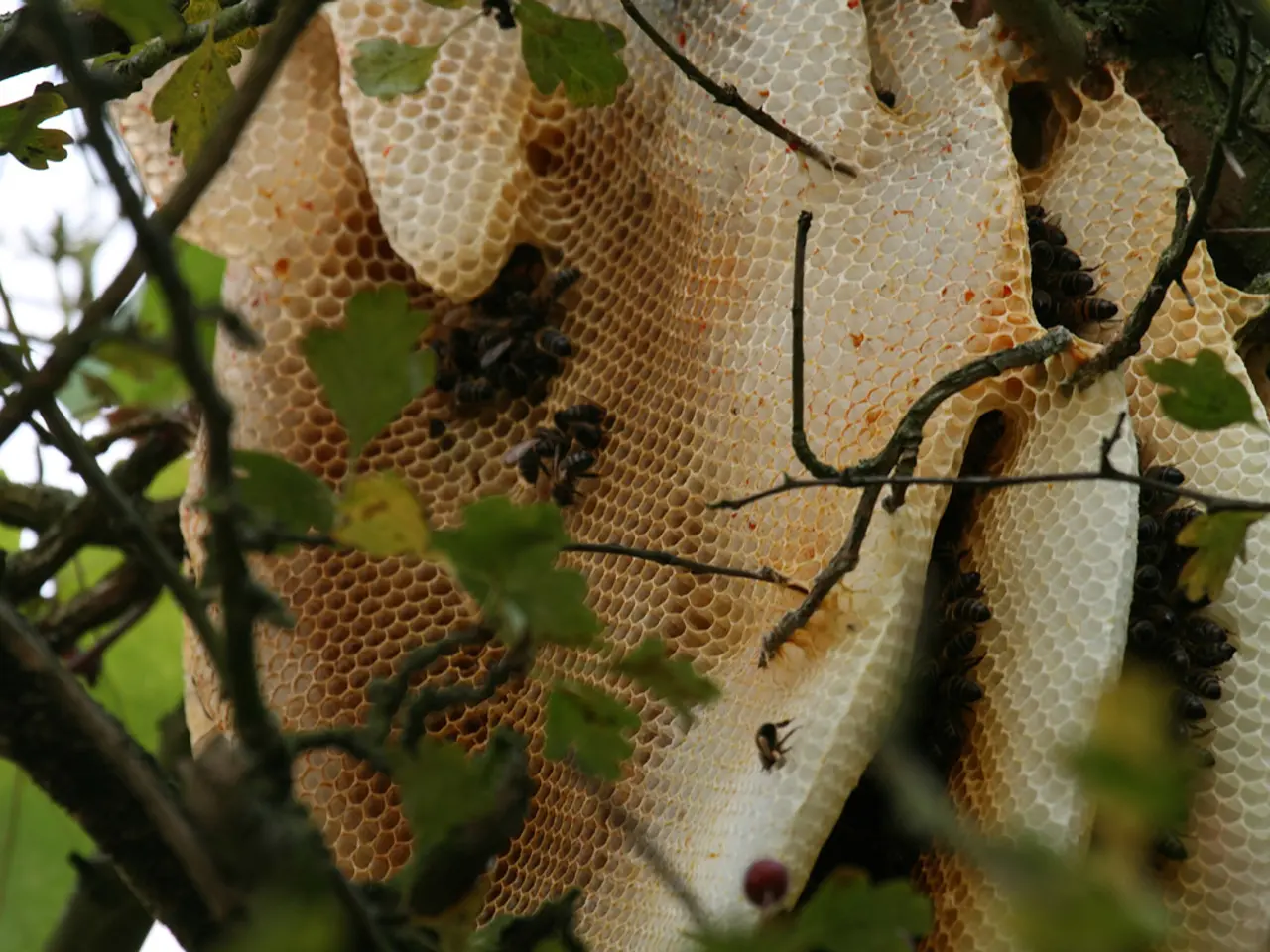Earth's honeybees display remarkable intelligence, a hidden quality often overlooked.
In the vibrant world of insects, few creatures capture our fascination quite like bees. These tiny, yet remarkable creatures play a crucial role in our ecosystem, and recent studies have revealed that they are far more intelligent than we once thought.
Bees, including honeybees and bumblebees, live in colonies that house a single queen, female workers, and male drones. This social structure is a testament to their cooperative nature. Bees are considered among the most intelligent insects, demonstrating advanced cognitive abilities such as recognizing individual faces, communicating through dancing, learning and copying efficient behaviors, and even understanding basic arithmetic [1].
Their intelligence appears superior to many other insects, making them "head-and-shoulders above" others in terms of cognitive complexity [1]. Other insects that display comparable levels of intelligence include ants, especially leafcutter ants, which exhibit complex behaviours like cultivating fungus as food and memorizing individual faces within their colonies [1]. However, bees tend to have higher cognitive capacities based on current assessments [1].
One of the most fascinating aspects of bee intelligence is their playful behaviour. For instance, bumblebees have been observed engaging with balls in ways suggestive of play, a sign of cognitive complexity not often attributed to insects [4].
Beyond their ecological roles, bees exhibit sophisticated mental processes and social behaviours. They are highly important for global food security and nutrition, as one out of every three mouthfuls of food we eat is dependent on insect pollinators, such as bees.
Bees have evolved over millions of years, with the oldest known Hymenopteran fossils, which include bees, dating back to the Triassic Period, around 224 million years ago [5]. Bees, particularly honeybees, evolved from wasps during the Jurassic Period, around 201 million years ago.
Despite their importance, bees are in decline. The number of bee species is decreasing for decades, and British bees have been lost from a quarter of the places where they used to be found 40 years ago. This decline poses a significant threat to the plants we depend on for food, as bees play a crucial role in pollinating many of them.
Despite this, bees continue to amaze us with their unique abilities. For example, most bees do not make honey, as only eight species of true honeybee make large amounts of the sweet stuff. Bees also navigate using the Sun as a compass, their internal clock, and Earth's magnetic field, allowing them to travel miles to forage in faraway flower patches.
The waggle dance is another fascinating aspect of bee communication. Honeybees use this dance to direct nestmates to nectar- and pollen-rich flowers. Bees have two primary modes of communication: the waggle dance and expressive smell.
From the smallest stingless bees, which have workers smaller than a grain of rice, to the biggest bee, Wallace's giant bee, which grows up to 4cm long, bees are a diverse and fascinating group of creatures. However, it's important to note that only honeybees die after stinging, as bars in their stingers get snagged in the victim's skin, and as the bee tries to free itself, its abdomen becomes fatally ruptured.
In conclusion, bees are not just the hardworking pollinators we rely on for food, but they are also highly intelligent creatures that can count, solve puzzles, and use simple tools. Understanding and protecting these vital creatures is essential for maintaining a healthy and diverse ecosystem.
References: 1. Ratnieks, F. L. W., & Anderson, K. (2001). The intelligence of bees. Trends in Ecology & Evolution, 16(11), 509-514. 2. Seeley, T. D. (2010). Honeybee Democracy. Princeton University Press. 3. Free, B. (2007). The Bee-friendly Garden. Timber Press. 4. Dukas, R. (2007). The Honey Bee. Oxford University Press. 5. Engel, M. S., Grimaldi, D. A., & Grimaldi, D. A. (2005). The Biology of the Hymenoptera. Oxford University Press.
- Research reveals that bees are far more intelligent than previously thought, demonstrating advanced cognitive abilities like recognizing individual faces, communicating through dancing, and even understanding basic arithmetic.
- Bees play a crucial role in our ecosystem and global food security, as one out of every three mouthfuls of food we eat is dependent on insect pollinators, such as bees.
- The evolution of bees can be traced back to the Triassic Period, around 224 million years ago, with the first known Hymenopteran fossils, which include bees.
- Despite their importance, bees are in decline, with the number of bee species decreasing for decades and British bees being lost from a quarter of the places where they used to be found 40 years ago.
- Understanding and protecting these vital creatures is essential for maintaining a healthy and diverse ecosystem, as they not only pollinate nutritious plants but also show complex social behaviors and mental processes.
- In space and astronomy, the behavior and physiology of bees can provide insights into the potential for life on other planets, given their complex behaviors and evolutionary adaptations like navigating using Earth's magnetic field.
- In mental health and wellness, spending time observing and learning about bees can lead to a connection with nature and contribute to overall well-being and stress reduction.
- Improved fitness and exercise can be achieved by emulating the bees' industrious and efficient behaviors, such as optimizing movements and conserving energy, adopting a "bee-like" approach to our daily tasks.




